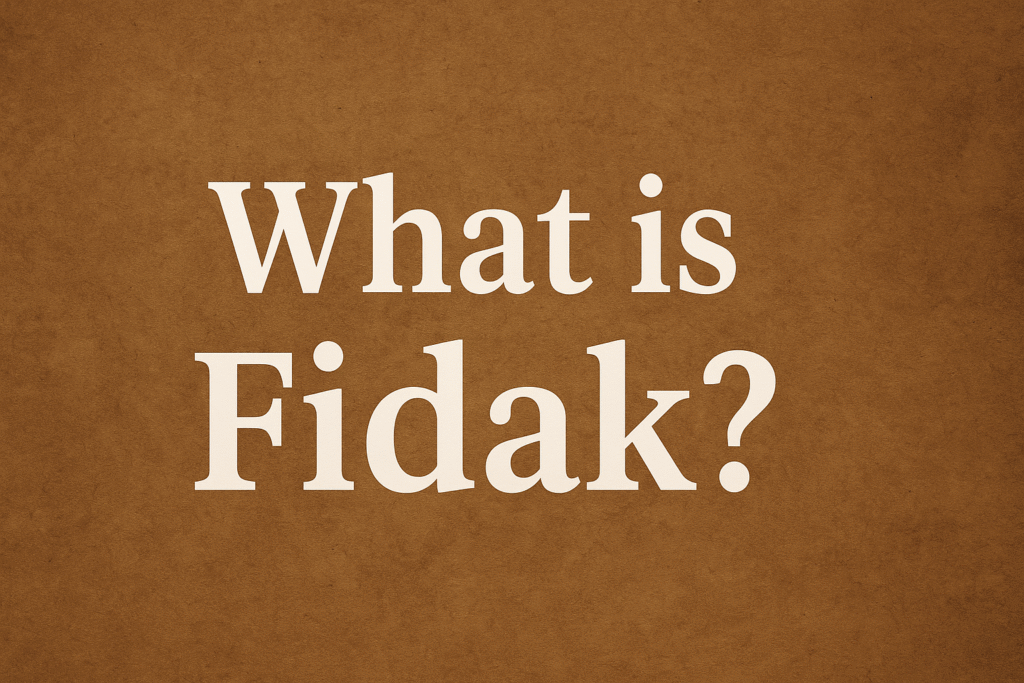Table of Contents
- Introduction
- What is Fidak in Islam?
- Historical Background of Fidak
- Prophet Muhammad (s.a.w.w) Gifting Fidak to Bibi Fatima (s.a)
- The Claim of Bibi Fatima (s.a) After Prophet’s Demise
- Abu Bakr’s Rejection of Fidak
- The Debate Between Bibi Fatima (s.a) and Abu Bakr
- Narrations & References from Sunni and Shia Books
- Aftermath of the Fidak Dispute
- The Role of Umar ibn al-Khattab in the Incident
- The Legacy of Fidak in Islamic History
- Lessons for Muslims Today
- Frequently Asked Questions (FAQ)
- Conclusion & Dua
Introduction
The story of Fidak is one of the most sensitive and significant chapters in Islamic history. It is not only about a piece of land but about justice, inheritance, and the rights of Bibi Fatima (s.a), the beloved daughter of Prophet Muhammad (s.a.w.w).
Understanding what Fidak was, why it was given to Sayyida Fatima (s.a), and how it was later confiscated, sheds light on the early events after the Prophet’s demise and the struggles of Ahlul Bayt (a.s).
What is Fidak in Islam?
- Fidak was a fertile agricultural land located near Khaybar, approximately 150 km from Madinah.
- It came into Muslim hands without battle after the Jewish tribe of Khaybar surrendered.
- According to Islamic law (fay’), such land belonged exclusively to Prophet Muhammad (s.a.w.w).
📖 Reference: Al-Kafi, Volume 1, Page 543 – narrates that the Prophet gave Fidak to his daughter Fatima (s.a) during his lifetime.
Historical Background of Fidak
- After the victory of Khaybar in 7 AH, Jews of Fidak offered half of their land to the Prophet in exchange for peace.
- This land became part of Bayt al-Mal under the Prophet’s direct control.
- Instead of keeping it for himself, the Prophet distributed much of it among the poor and gave the entire estate of Fidak to Bibi Fatima (s.a).
📖 Reference: Tarikh al-Tabari, Volume 3, Page 221
Prophet Muhammad (s.a.w.w) Gifting Fidak to Bibi Fatima (s.a)
Several authentic narrations (both Sunni & Shia) confirm that the Prophet gifted Fidak to his daughter:
- Shia Sources:
- Al-Kafi (vol. 1, p. 543): Imam Ja’far al-Sadiq (a.s) narrates that Prophet gave Fidak to Fatima (s.a).
- Bihar al-Anwar (vol. 29, p. 189).
- Sunni Sources:
- Baladhuri’s Ansab al-Ashraf (vol. 1, p. 582) mentions Fatima (s.a) as the owner of Fidak.
- Musnad Ahmad ibn Hanbal (vol. 1, p. 47) narrates that Fatima (s.a) had authority over Fidak.
Thus, Fidak was legally owned by Bibi Fatima (s.a) during the Prophet’s lifetime.
The Claim of Bibi Fatima (s.a) After Prophet’s Demise
After Prophet Muhammad (s.a.w.w) passed away, Abu Bakr (the first caliph) seized control of Fidak.
Bibi Fatima (s.a) went to claim her rightful land, but her claim was denied.
Abu Bakr cited a hadith:
“We, the Prophets, do not leave inheritance; what we leave is charity.” (Sahih al-Bukhari, Book 51, Hadith 19).
Fatima (s.a), however, challenged this hadith by quoting Qur’anic verses where earlier Prophets like Sulayman (a.s) inherited Dawud (a.s) (Qur’an 27:16).
The Debate Between Bibi Fatima (s.a) and Abu Bakr
The sermons and debates of Fatima (s.a) regarding Fidak are well-documented:
- In Masjid al-Nabawi, she delivered a powerful khutbah (known as Khutbah Fadakiyya) arguing her right to Fidak.
- She presented Qur’anic evidence that inheritance applies to Prophets as well.
📖 Reference: Bihar al-Anwar, vol. 29, p. 223
Narrations & References from Sunni and Shia Books
- Al-Kafi, vol. 1, p. 543 – Prophet gave Fidak to Fatima (s.a).
- Bihar al-Anwar, vol. 29, p. 189 – Imam Ali (a.s) confirms ownership.
- Musnad Ahmad ibn Hanbal, vol. 1, p. 47 – narrates Prophet’s gift to Fatima.
- Tarikh al-Tabari, vol. 3, p. 221 – mentions Fidak’s transfer.
- Sahih Muslim, Book 31, Hadith 5920 – discusses Abu Bakr’s refusal.
Aftermath of the Fidak Dispute
- Bibi Fatima (s.a) returned from the court deeply hurt.
- Historical accounts state that she never spoke to Abu Bakr again until her death. (Sahih al-Bukhari, Book 59, Hadith 546).
- Imam Ali (a.s) supported her stance, but political pressure prevented further action.
The Role of Umar ibn al-Khattab in the Incident
Historical Shia sources mention that Umar threatened to burn the house of Fatima (s.a) if Imam Ali (a.s) did not give allegiance. (Tarikh al-Tabari, vol. 2, p. 233).
This event is directly tied to the Shahadat of Bibi Fatima (s.a) due to injuries sustained during this oppression.
The Legacy of Fidak in Islamic History
- Fidak became a symbol of justice and oppression.
- For Shia Muslims, it represents the denial of the rights of Ahlul Bayt (a.s).
- Later caliphs like Umar ibn Abdul Aziz returned Fidak to the descendants of Fatima (s.a), only to be seized again.
Lessons for Muslims Today
- Justice is the foundation of Islam.
- Women’s rights in Islam were established by the Prophet (s.a.w.w) and must be upheld.
- Historical honesty is vital for Muslim unity.
- The sacrifice of Fatima (s.a) teaches resilience and standing against oppression.
Frequently Asked Questions (FAQ)
Q1: What was Fidak in Islam?
Fidak was a fertile land near Khaybar given to Bibi Fatima (s.a) by Prophet Muhammad (s.a.w.w).
Q2: Why did Abu Bakr refuse to give Fidak?
He cited a hadith that Prophets do not leave inheritance, which Fatima (s.a) challenged with Qur’anic evidence.
Q3: Did Bibi Fatima (s.a) own Fidak during the Prophet’s life?
Yes, both Sunni and Shia sources confirm it was gifted to her.
Q4: What happened after Fidak was denied?
Fatima (s.a) never forgave Abu Bakr and passed away in grief shortly after.
Q5: What does Fidak symbolize today?
It symbolizes the rights of Ahlul Bayt (a.s) and the struggles faced after the Prophet’s death.
Conclusion & Dua
The story of Fidak is not just about land. It reflects the early struggles of Ahlul Bayt (a.s), the courage of Bibi Fatima (s.a), and the importance of justice in Islam.
May Allah grant us the wisdom to learn from this history and the strength to follow the path of truth.
اللهم صل على محمد وآل محمد

